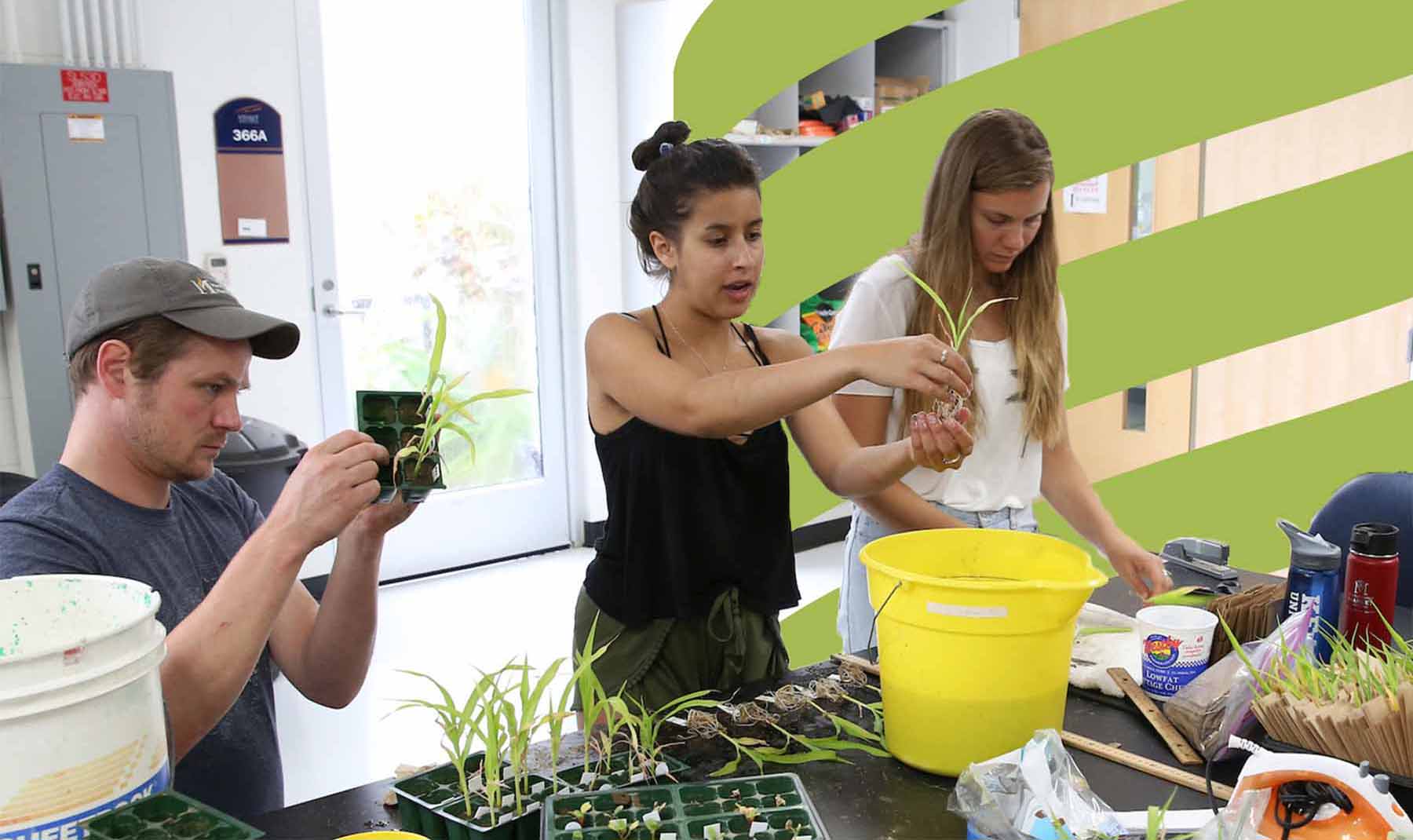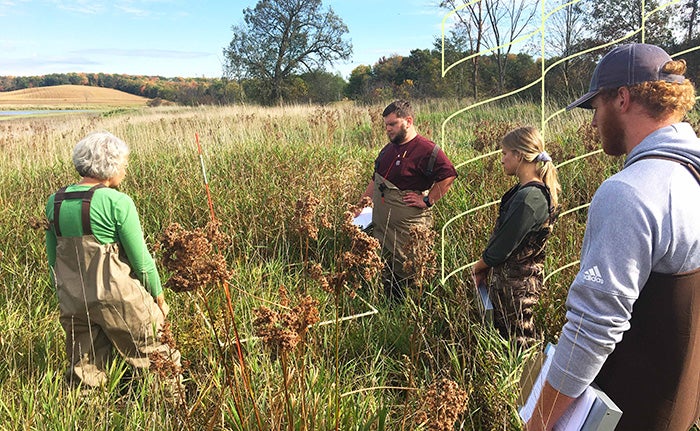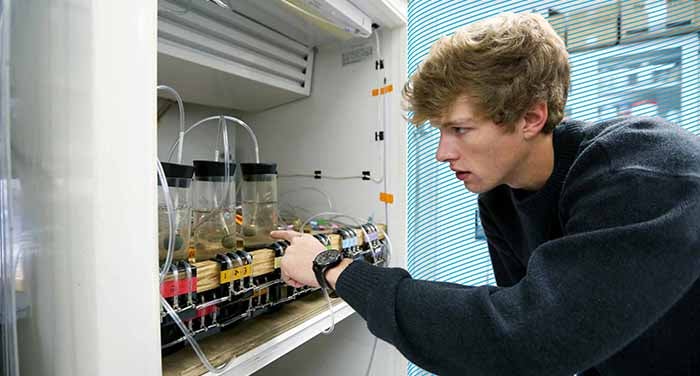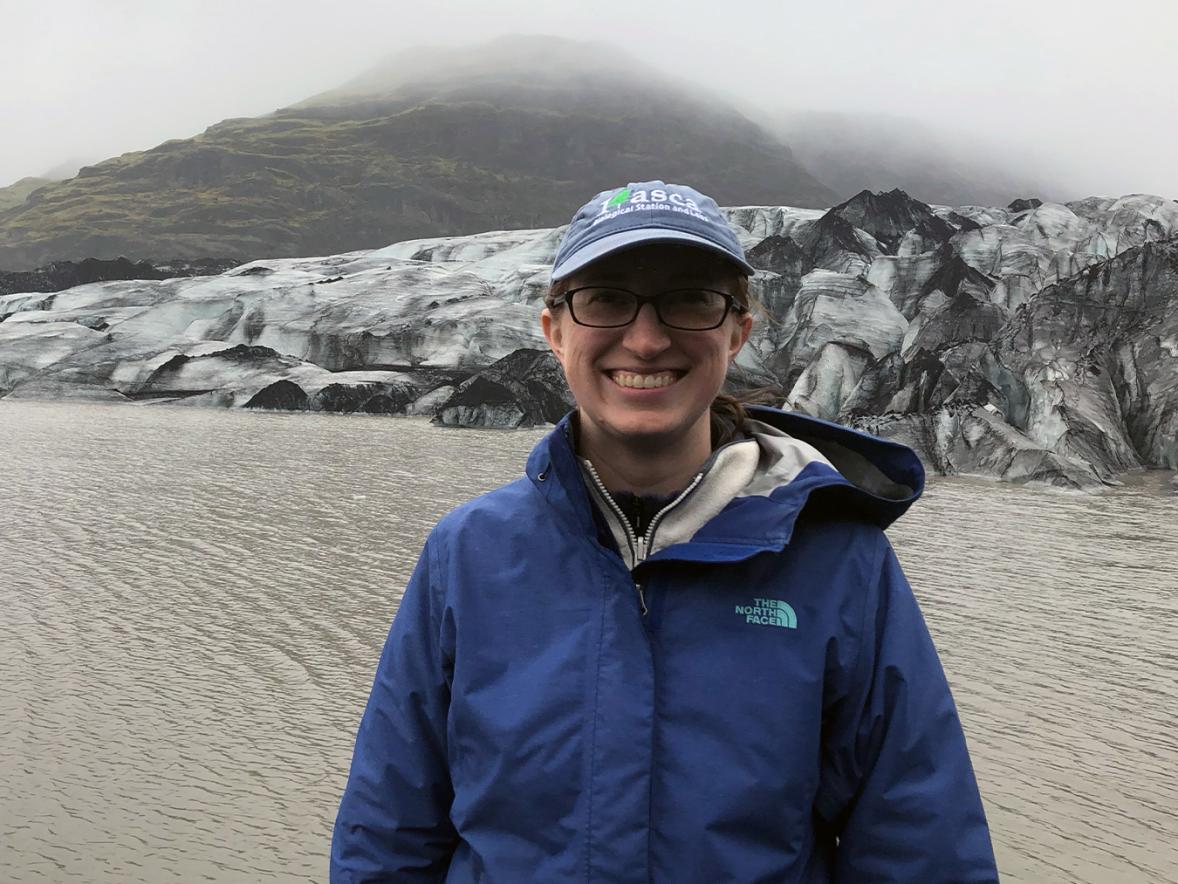Pursue Your Passion for the Natural World
Set yourself up for a career protecting nature, keeping our air and water clean, and sustainably managing resources. UW-Stout's Bachelor of Science (B.S.) in Environmental Science program prepares you for careers in conservation, environmental health, and sustainable management of our natural resources. With ample hands-on opportunities for water quality research, restoration work, and environmental impact studies, our program focuses on helping you develop practical skills through applied research, lab-based learning, and field experiences that address real environmental problems. Whether you’re planning on grad school or diving straight into your dream job, a major in environmental science will prepare you for a lifetime of impact.
100% of Graduates Are Employed or Continuing Education Within 6 Months
Career-Focused Curriculum
In your first year, you'll take introductory courses in biology, chemistry, mathematics, and other core disciplines, along with a one-credit Environmental Science Profession course to better identify possible career tracks. As you advance, you'll build in-depth knowledge with specialized courses in specific subject areas.
- Organismal Biology: Plant Biology, Zoology, Ichthyology, Wildlife Techniques, Natural History of the Neotropics (Belize), Vascular Plant Taxonomy, Applied Plant Science for Conservation and Management, and Entomology.
- Ecological Systems: Ecology, Soil Science and Conservation, Restoration Ecology, and Intermediate and Advanced Geographic Information Systems.
- Environmental Health & Chemistry: Epidemiology, Environmental Toxicology, Analytical Chemistry, and Environmental Chemistry.
- Advanced Aquatic Studies: Aquatic Ecology and Management, Wetland Ecology and Delineation, and Applied Watershed Hydrology.
Pursue the Concentration That Meet Your Career Goals
- Aquatic Biology: Pursue a career in aquatic and wetland ecosystem management and restoration, fishery science, limnological research, and water quality testing.
- Environmental Health: Pursue opportunities in public health and epidemiology, pollution monitoring, environmental remediation, food safety and security, and toxicology research on new chemicals.
- Human Dimensions: Focus on working with stakeholders and community members in environmental management, conservation planning, non-profit leadership, environmental justice, environmental policy, conservation advocacy, and outreach and education.
- Natural Resource Conservation: Dedicate your career to ecological restoration, land management, wildlife and wildlands conservation, ecological monitoring, wetland delineation, and soil conservation.
Use the Request Information form to receive a program summary and learn more about the Bachelor of Science degree in Environmental Science.
Request Information
Industry-Experienced Faculty Instruction
Forget TA-taught classes and 200-person lectures. At UW-Stout, building close relationships with our industry-experienced and academically accomplished environmental science faculty will play a key role in your polytechnic education and your career. Learn more about your future instructors!

Do More on Day One in Our Labs & Facilities
Take your education and research to the next level in UW-Stout's on-campus labs and facilities. Additionally, as an upper-level student, you'll expand your professional experience through site visits that reinforce and contextual topics covered in class.
- Greenhouse: Gain horticultural skills, study bioremediation, and grow native plants for local restoration projects.
- Campus Garden: Learn about sustainable agriculture, market gardening, pest management and volunteer management.
- Center for Limnological Research & Rehabilitation (CLRR): Collect and analyze water samples to study lake pollution and remediation.
- Analytical Chemistry Laboratories: Study water, air, and sediment pollution
- Outdoor Classroom Campus Natural Area: practice restoration techniques and learn about invasive species.
- Natural History Collections: preserve, catalog, and study plant and animal specimens.
Enhance Your Resume With Professional Certifications
In addition to career-focused coursework, you can get a jumpstart on industry-related certifications that complement and distinguish your skills through certification courses offered at UW-Stout or nearby partners.
- Chainsaw Certification
- CPR/ First-Aid Certification
- Pesticide Application Certification
- Prescribed Burn Certification

“Working in the field helps me learn faster and understand concepts. I know a lot of students at other universities and colleges don't get opportunities for hands-on learning like this, and it is good experience for future internships and jobs."
~ Keaton Kuzel
Make an Impact Through Applied Research
Do good and drive innovation by creating real-world solutions to existing societal challenges! Unlike traditional theoretical research, your applied research opportunities in environmental science will focus on translating inquiry into meaningful action and impact. Students have presented at and attended research conferences, including The Prairie Enthusiasts, Wisconsin Wetlands Association, National Council of Undergraduate Research, National Environmental Health Association, and the Ecological Society of America.
Recent Environmental Science Research Topics
- Wetland restoration project success on local WRP wetlands
- Social-environmental science research on Lake Menomin and the Red Cedar Watershed
- Dobb’s Landing prairie management (collaboration with The Prairie Enthusiasts)
- Environmental management plan development and invasive species monitoring
- Rare plant species and moss surveys
- Radiation surveys
- Assessment of pesticides in local well waters
- Human health effects of harmful algal blooms
Professional Internships in Environmental Science
Take your education into the field and earn while you learn through UW-Stout’s award-winning Cooperative Education & Internship Program (CEIP) and other placements. Our professional paid and unpaid credit-earning experiences connect you with leaders in your field, including state and county agencies, conservation corps and conservancies, and other organizations to ensure you’re set up for success long before you graduate.
Recent Internship Employers
- Adaptive Restoration LLC
- Berry Global, Inc.
- Conservation Corps Minnesota & Iowa
- CORRE, Inc.
- Dive Guys LLC
- Dunn County Land & Water Conservation Division
- Eco-Justice Center
- Great Lakes Indian Fish & Wildlife Commission
- Midwest Prairies
- River Country Co-op
- U.S. Army Corps of Engineers
- Wisconsin Department of Natural Resources
Take Your Education Farther with International Study
Enhance your undergraduate experience through faculty-led WinTerm and summer travel courses, university semester abroad experiences, and national student exchange opportunities.
- Natural History of the Neotropics (BIO-270) provides a chance to study in Belize
- Science, the Environment & Sustainability (BIO-111) offers a chance to study in Hawai'i
- Semester programs are available in Fiji and Australia
Expand Your Opportunities Through Our Professional Partnerships
Unlike traditional degree programs, the B.S. Environmental Science program's close ties with external partners will connect you with leading state, regional, and national partners. While other students are still reading about your field, you’ll be networking, learning, and volunteering with potential employers.
Nonprofit, Public & Private Partners
- City of Menomonie
- Colfax Red Cedar Preserve & Recreation Area
- Dunn County Health Department
- Dunn County Conservation Department
- Landmark Conservancy
- The Prairie Enthusiasts (Chippewa Savannas Chapter)
- Red Cedar River Water Quality Partnership
- Trout Unlimited (Clearwaters Chapter)
- USDA Natural Resource Conservation Service
- Wisconsin Department of Natural Resources

"The program prepared me to accomplish the tasks that employers in all different fields of science are looking for—from the lab to the field. I never felt unprepared."
~ Tyler Christensen
Graduate Ready to Solve Tomorrow's Environmental Challenges
Each year, Stout environmental science graduates are among the most sought-after hires to enter the workforce, routinely beating out applicants from bigger schools for coveted conservation, land management, and sustainability positions across a wide range of industries. Why? Everything you learn at Stout enhances the skills you'll use on day one of your career. Where others list their education, you’ll be able to identify your experience.
Select Recent Employers
- ACRT
- Chippewa County Land Conservation & Forest Management
- CTE Global, Inc.
- Eurofins Agroscience Services, Inc.
- Field Environmental Instruments, Inc.
- Idaho Fish and Game
- Kohner Materials Companies
- Merjent, Inc
- Montrose Environmental Group
- NV5
- Organic Valley
- Premier Prairie & Wetland Restorations LLC.
- Species360
- Tetra Tech
- U.S. Army Corps of Engineers
- U.S. Department of Agriculture
- U.S. Geological Survey
- Wisconsin Department of Natural Resources
"I originally went to Stout unsure of what I wanted to do. Then I changed majors and entered the environmental science program. From there on out I felt like I had found where I was supposed to be. I enjoyed the professors, the students in the program, and the material taught. It’s been a great four years."
~ Peter Kleinschmidt
“My education at Stout prepared me for a career in the natural resources field. Student research projects provided me with the skills necessary to secure an internship and subsequent jobs. My professors provided me with a sense of belonging and a better understanding of the realities I would face during my career.”
~ Chandra Wiley
"The Environmental Science program helped me be successful because it allowed me to grow as a scientist and researcher. This program allowed me to experience different opportunities that led me to what career I would want to be working in the future."
~ Kat Cardinal
As an environmental science student, there are several campus student organizations devoted to connecting you with other students who share your interests.
- Alfresco Student Outings Club
- American Fisheries Society (Student Chapter)
- Ducks Unlimited
- GreenSense
- National Environmental Health Association (Student Chapter)
- Natural Areas Club
Advisory Committee Members
| First Name | Last Name | Title | Organization |
|---|---|---|---|
| Elizabeth | Bartho | Student | UW-Stout |
| Mike | Bessert | Professor; Program Director, M.S. Conservation Biology | UW-Stout |
| Julie | Beston | Assistant Professor | UW-Stout |
| Michelle | Carlisle | Wildlife Biologist, Menomonie Field Station | Wisconsin Department of Natural Resources |
| Julia | Chapman | Lecturer; Program Director, M.S. Sustainable Managment | UW-Stout |
| Chase | Cummings | County Conservationist | Dunn County Land & Water Conservation |
| Connor | Dougherty | Lab Manager, Center for Limnological Research & Rehabilitation | UW-Stout |
| Lyndsey | Flaten | Water Monitoring Technician | Ramsey-Washington Metro Watershed District |
| Daniel | Freedman | Dean, CSTEMM | UW-Stout |
| Kathryn | Gallagher | Director | Dunn County Health Department |
| Holly | Geurts | Soil Conservationist | USDA Natural Resource Conservation Service |
| Keith | Gilland | Assistant Professor | UW-Stout |
| Katie | Hahn | Stewardship Specialist | The Nature Conservancy |
| Nicole | Hayes | Assistant Professor | UW-Stout |
| Anna | Hilger | Chemist; Microbiologist | Eau Claire Environmental Health Division of Environmental Health Department |
| Megen | Hines | Environmental Program Coordinator | City of Menomonie |
| Jeffrey | Jackson | Wastewater Specialist/CAFO Permits | Wisconsin Department of Natural Resources |
| Timothy | Jackson | Agricultural Land Use, Planning & Ordinance Specialist | Wisconsin Department of Agriculture, Trade & Consumer Protection |
| Arthur | Kneeland | Senior Lecturer | UW-Stout |
| Matthew | Kuchta | Professor | UW-Stout |
| Tina | Lee | Professor; Program Director, B.S. Applied Social Science | UW-Stout |
| Mandy | Little | Professor; Program Director | UW-Stout |
| Halle | Maki-Waller | Student | UW-Stout |
| Scott | McGovern | Senior Lecturer | UW-Stout |
| Innisfree | McKinnon | Assistant Professor | UW-Stout |
| Jacob | Nadeau | Water Regulations & Zoning Specialist | Wisconsin Department of Natural Resources |
| Bill | Schmidt | Natural Resource Specialist | Eau Galle Recreational Area |
| Marion | Shambeau | Owner | 4-Control |
| John | Sippl | District Conservationist | Dunn County Natural Resource Conservation Service |
| Amanda | Smith | Water Resources Management Specialist | Wisconsin Department of Natural Resources |
| Missy | Sparrow-Lien | Wildlife Biologist, Menomonie Field Station | Wisconsin Department of Natural Resources |
| Peter | Strand | GIS Specialist | Eau Claire County |
| Elizabeth | Usborne | Nonpoint Source Coordinator | Wisconsin Department of Natural Resources |
| Ana | Vande Linde | Professor | UW-Stout |
| Amanda | Veith | Environmental Health Inspector | Hennepin County, Human Services and Public Health Department, Epidemiology and Environmental Health |
| Cassondra | Vernier | Assistant Professor | UW-Stout |
| Ted | Welch | Student | UW-Stout |
| Kasey | Yallaly | Fisheries Biologist | Wisconsin Department of Natural Resources |







